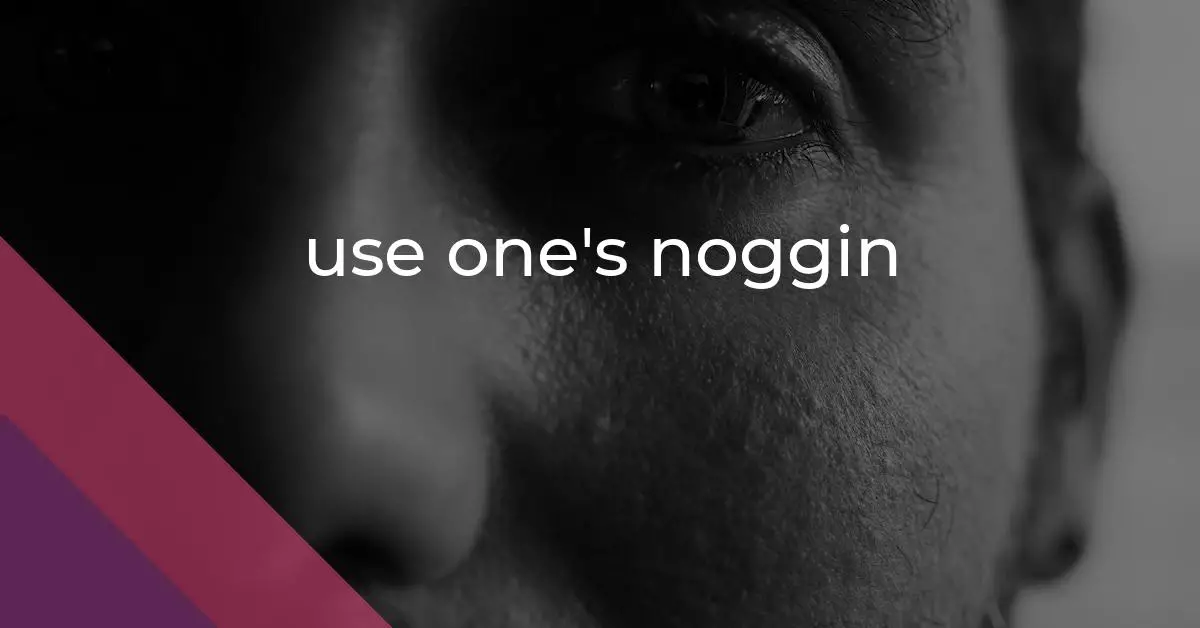use one’s noggin: Idiom Meaning and Origin
What does ‘use one's noggin’ mean?
The idiom "use one's noggin" means to use one's brain or think carefully about something. It implies using intelligence or common sense to solve a problem or make a decision.

Idiom Explorer
The idiom "use one's head" means to think or make use of one's intelligence and logical reasoning in order to solve a problem or make a decision.
The idiom "to one's mind" means expressing one's opinion or viewpoint on a subject or issue. It refers to the thoughts and beliefs that someone holds, indicating personal perspective.
The idiom "think with one's little head" means to make decisions based on sexual desires or impulses rather than logical reasoning.
The idiom "think up" means to create or invent something, typically an idea or plan, using one's imagination or creativity.
The idiom "think over" means to carefully consider or ponder something before making a decision or forming an opinion.
The idiom "think on one's feet" means to quickly and effectively make decisions or come up with solutions in a fast-paced or unexpected situation.
The idiom "stand on one's head" means to easily and confidently accomplish a task or overcome a challenge. It implies that the action required is so simple for the person, they could do it even with the added difficulty of standing on their head.
The idiom "scratch one's head" means to be confused or perplexed about something, often trying to find a solution or understanding. It implies a gesture of scratching one's head as a sign of puzzlement or deep thought.
The idiom *put one's mind to it* means to concentrate or focus one's thoughts and efforts on a particular task or goal.
The idiom "pick someone's brain" means to obtain information or advice from someone by asking them questions and seeking their expertise or knowledge.
Cracking Open the Noggin
The idiom "use one's head" is another common English phrase that carries a similar meaning to "use one's noggin." Just like "use one's noggin," it is used to encourage someone to think and reason logically. The phrase "use one's head" implies that one should use their brain or intelligence to solve problems or make decisions. It is often used in everyday conversations, whether as friendly advice or a simple reminder to think before acting.
Similarly, the idiom "beat one's brain" is yet another expression that conveys the idea of using one's intelligence or mental abilities to find a solution. The phrase suggests that one should exercise their brainpower, as if metaphorically beating or forcing the brain to work harder. "Beat one's brain" is often used in situations where someone is struggling to come up with an answer or solution and needs to put in extra effort to think things through.
The connection between these idioms and "use one's noggin" lies in their shared emphasis on using one's brain and mental faculties. They all encourage individuals to think, reason, and problem-solve, highlighting the importance of cognitive abilities in navigating various challenges.
In everyday conversations, it is common to use idiomatic expressions like "use one's noggin," "use one's head," or "beat one's brain" to encourage critical thinking, creative problem-solving, and logical reasoning. These idioms serve as reminders that our brains are powerful tools that can help us overcome obstacles, make sound decisions, and find innovative solutions.
Whether we're facing a complex problem at work, trying to navigate a personal challenge, or simply seeking to expand our knowledge and understanding of the world, these idioms remind us to tap into our cognitive abilities and engage our brains fully. They remind us that thinking actively, critically, and resourcefully is a valuable asset in our personal and professional lives.
For example, let's consider a situation where a group of colleagues is brainstorming ideas for a new marketing campaign. As they discuss various strategies and approaches, someone might interject and say, "Come on, guys, let's use our noggin and come up with something truly creative and innovative!" This remark encourages the team to think outside the box, use their intelligence, and bring their best ideas to the table.
In a similar scenario, if someone is having trouble finding a solution to a complex problem, a friend might say, "Why don't you take a step back and use your head? Sometimes the answer is right in front of you." This advice urges the individual to think carefully, analyze the situation, and consider different perspectives in order to find a solution.
Finally, imagine a student preparing for an important exam. Their friend might offer some words of encouragement, saying, "I know it's challenging, but beat your brain a little harder and study strategically. You've got this!" This support reminds the student to push themselves intellectually, study diligently, and use their intelligence effectively to achieve their goals.
Overall, idiomatic expressions such as "use one's noggin," "use one's head," and "beat one's brain" provide a playful and engaging way to encourage critical thinking, problem-solving, and intellectual engagement. By incorporating these phrases into our everyday conversations, we create a culture that values intelligence, resourcefulness, and cognitive growth. So, the next time you find yourself faced with a perplexing challenge or seeking a fresh perspective, remember to use your noggin, use your head, and beat your brain for the best possible outcome.
Example usage
Examples:
- He used his noggin to solve the complex puzzle and came up with a brilliant solution.
- I forgot the keys to my car, but then I used my noggin and remembered that I had a spare set in my desk drawer.
- Instead of relying on others, she decided to use her noggin and figure out a way to complete the project on her own.
More "Cognition" idioms



